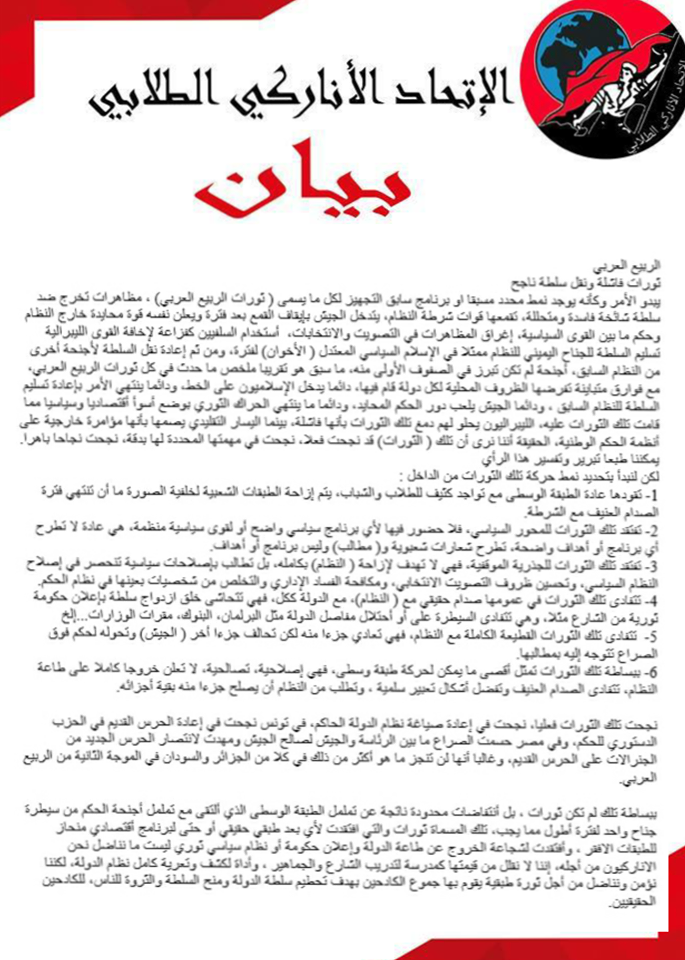From our friends of Tunisian Anarchist Union, translated by our compañeros of ASF-IWA Australia :
The Arab Spring: failed revolutions and a successful transfer of power
It seems as if there is a predetermined pattern or a pre-equipped program for all the so-called (Arab Spring revolutions), demonstrations against a corrupt and decaying old authority, suppressed by the regime’s police forces, the army intervenes to stop the repression after a while and declares itself a neutral force outside the regime and rule among the political forces The Salafis were used as a scarecrow to frighten the liberal forces, handing power to the right wing of the regime represented in the moderate political Islam (the Brotherhood) for a while, and then transferring power to other wings of the former regime, wings that did not emerge in the first rows of it, the above.
Formelly speaking, this is almost a full success !
What happened in all the Arab Spring revolutions, with different differences imposed by the local circumstances of each state, the Islamists always enter the line, always end up handing over power to the former regime, the army always plays the role of neutral government, and the revolutionary movement always ends in a worse economic and political situation.
On the political front, liberals like to call these revolutions failures, while the traditional left atributes those failures to external conspiracies against [sovereignty and] national regimes. All this shows us on the contrary that those Revolutions have succeeded in fulfilling their mission.
We can, of course, justify and explain this view
But let’s start by defining the pattern of movement of these revolutions from within:
1 – usually led by the middle class with a heavy presence of students and youth, the popular classes are shifted to the background of the picture once the period of violent clash with the police.
2. These revolutions lack the political axis, where there is no presence of any clear political program or organized political forces. They usually do not present any clear program or objectives, which offer populist slogans and (demands), not programs or objectives.
3 – These revolutions lack a radical position, they do not aim to remove (the whole) system, but calls for political reforms limited to reform the political system, and improve the conditions of voting, and combat administrative corruption and get rid of certain figures in the system of government.
4 – These revolutions generally avoid a real clash with the (regime), with the state as a whole, it avoids the creation of dual power by declaring a revolutionary government from the street, for example, and it avoids the control or occupation of the joints of the state such as parliament, banks, headquarters of ministries, etc.
5 – Avoiding those revolutions complete break with the regime, they are hostile to part of it, but the alliance of another part (the army) and its transformation to rule over the conflict addressed to its demands.
6 – These revolutions simply represent the maximum possible movement of the middle class, they are reformist, conciliatory, does not announce a complete departure from obedience to the system, avoid violent clash and prefer peaceful forms of expression, and ask the system to repair part of the rest of its parts.
These revolutions succeeded, they succeeded in reshaping the ruling state system. In Tunisia, they succeeded in restoring the old guard in the Constitutional Party to rule, and in Egypt, the conflict between the presidency and the army in favor of the army has paved the way for the new generals’ guard over the old guard, even though they often will not produce the desired results. It is even more so in both Algeria and Sudan in the second wave of the Arab Spring.
Simply these were not revolutions, but rather limited uprisings resulting from the restlessness of the middle class, which met with the restlessness of the wings of government from the control of one wing for too long, those called revolutions, which lacked any real class dimension or even a biased economic program for the poorer classes, and lacked the courage to depart from Obeying the state and declaring a revolutionary government or political system are not what we anarchists are fighting for.
We do not underestimate its value as a school to train the street and the masses, and an instrument to expose and expose the entire state system, but we believe and strive for a class revolution by masses of hard-working people in order to destroy the authority of the state and give power And wealth for people, For real hardworking people.
Union des anarchistes Tunisiens

Original in Arabic : http://cnt-ait.info/2019/10/18/printemps-arabe-fr
French Translation : http://cnt-ait.info/2019/10/18/printemps-arabe-fr
Spanish Translation : http://cnt-ait.info/2019/10/18/printemps-arabe-es
Portuguese Translation : http://cnt-ait.info/2019/10/18/Printemps-arabe_pt